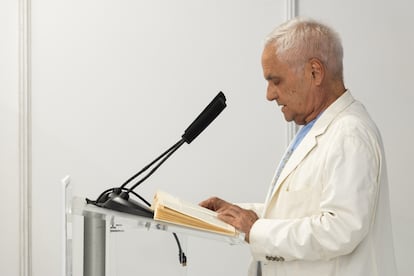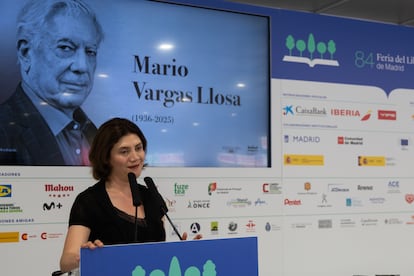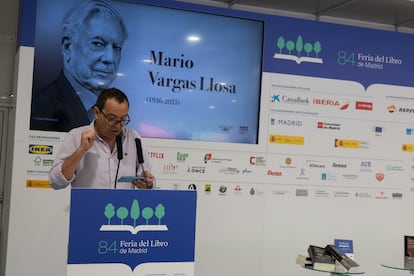“I learned to read at age five and it is the most important thing that happened to me in life,” said an appointment on the screen, next to the effigy of Mario Vargas Llosa. It has been the presence that has presided over the tribute of the Madrid Book Fair, this Saturday, to the Hispanic Peruvian Prize, who died on April 13 at 89. Outside the Ibero -American pavilion, the reading masses ran to the booths under intense heat and queued to get a bottle of water.
Pilar Reyes, editorial director of the Penguin Random House Literary Division began (where the Alphaguara publishing house is framed, which publishes the author’s works), who emphasized the writer’s relationship with Madrid. “In this city it was his first European experience, and it is the city in which he would end up living. He was the protagonist of his writing process, so today we also celebrated Mario’s relationship with Madrid.”
Next, several writers read fragments of their work. The director of the Fair began, Eva Orúe, although with an extraliterary matter: “I want to apologize for what happened yesterday (in reference to the closure of the fair in the afternoon by the weather conditions), a fair that begins by closing its doors is a strange fair. The world fell apart. I trust that everything happens from now on as it has happened.” Shortly after it was known that it had to be opened in the afternoon an hour late, at 18.00, due to extreme heat. Time, either because of heat, wind or rain, is usually the news that this free event is spoke every year: there is talk of both time and books, and closures generate controversy and conflict.
Let’s go back with Vargas. The journalist Juan Cruz, who was his editor and interviewed him in countless occasions participated. “Years ago I accompanied Vargas Llosa the first time he decided to come to the fair, after many indecisions,” he recalled. “A friend has asked me to read one thing, another friend another, and I’m going to read another,” he joked before reciting a fragment of the volume of memoirs The fish in the water.

The writer and academic of the RAE Javier Cercas recalled the “shock“That she produced reading, with only 17 years, of The city and dogs. “I have read everything that Vargas Llosa wrote. This novel, in 1979, I have the book marked with the date. It is a masterpiece, one of the best novels of our language. It deals with some teenagers in a military school, such as to which Vargas Llosa was sent by his father, with whom he always got along very badly, so that a man was made, to straighten him, because he was a child of his mother. This book was a child shock For me, and I suppose it will be for each person who reads it. ”
The critic Jordi Gracia (attached to the direction of El País) was fixed on the essay facet of Vargas Llosa, through The perpetual orgy: “A passionate essay on Madame Bovary And Gustave Flaubert, that Vargas snatched compulsively and made him immerse in the private life of both Flaubert and Bovary, as well as in his own life. ”The writer Manuel Rivas made reference to the“ fertile look and the sincere hand ”, as said of the painters of the flamenco school, to describe the Nobel Malaparte: “Contemporary authors do not read each other, they are monitored.”
Rosa Montero, Santiago Roncagliolo, Carlos Granés (who aroused hilarity with a fragment where Vargas Llosa speaks of the relationship of a Rastafari with marijuana), among other writers, and some people of the public. Or actor Pedro Casablanc, who participated in The tales of the plaguethe play in which the writer himself acted, a recreation of the stories of the Outbreak of Bocaccio. A “corsair raid” in the world of interpretation, in the words of Pilar Reyes.

Claudia Piñeiro recalled an anecdote when she participated in the jury of the Alfaguara Award presided by Vargas Llosa and took a copy of pocket of Pantaleon and visitors. The Nobel was surprised: it was a very rare edition that had had to withdraw from bookstores. The cover photo, where some women came out, had been bought in an image bank. But it had been taken without permission by the photographer, which caused the stupor of the appearing parties when they saw their image, so they requested their withdrawal. “Now I keep the copy with much love: first, because it has a prohibited cover; second, because it is signed by Mario Vargas Llosa.”
“Mario Vargas Llosa’s novels are monuments of the genre, and his thought is totally alive,” concluded Pilar Reyes, “it is already a classic that we can continue visiting and will continue to illuminate the world.”

